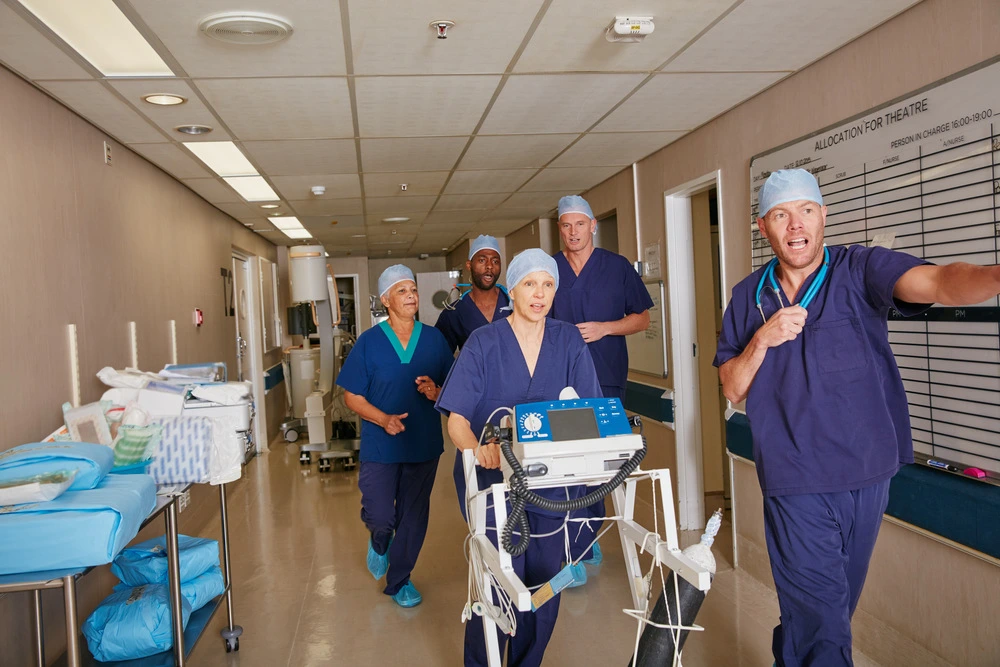Working in the Intensive Care Unit (ICU) represents one of the most demanding, skill-intensive, and emotionally charged experiences within healthcare. Whether in trauma centers, academic institutions, or community hospitals across the United States and Canada, professionals working in ICU face unique clinical responsibilities and ethical challenges daily.
This article provides an in-depth exploration of what working in the ICU involves, drawing attention to necessary education, essential competencies, career pathways, workplace dynamics, and strategies for long-term career success.

The Role and Purpose of the ICU in Modern Healthcare
The intensive care unit serves as the cornerstone of critical care medicine. To deliver continuous, high-acuity care, the ICU brings together advanced technology, specialized clinical expertise, and coordinated teamwork in fulfilling its roles and responsibilities.
1. Providing Continuous, Life-Sustaining Monitoring and Intervention
Patients admitted to ICUs typically present with life-threatening conditions that require constant monitoring, specialized interventions, and multidisciplinary management. Professionals working in ICU—ranging from physicians and nurses to respiratory therapists and pharmacists—collaborate to stabilize physiological functions such as cardiac rhythm, respiration, and metabolic balance.
2. Administering Condition-Specific Care Through Specialized Units
ICUs in North American healthcare systems vary by specialty, including medical, surgical, cardiac, neurological, and neonatal units. In major academic hospitals, subspecialty ICUs often coexist with step-down or high-dependency units to allow graduated levels of care. This structure ensures targeted treatment aligned with the severity and type of illness.
3. Supporting Precision Care Through Advanced Technology
The infrastructure in the ICU reflects advanced technology integration, including ventilators, continuous renal replacement therapy (CRRT) machines, invasive hemodynamic monitors, and electronic medication systems that comply with HIPAA data privacy regulations in the United States and similar provincial standards in Canada. These technologies enhance clinical accuracy and patient safety.
4. Promoting Safety Through Evidence-Based Design and Protocols
Critical care medicine evolved significantly after the polio epidemics of the 1950s, which led to innovations in mechanical ventilation and the development of specialized nursing. Since then, ICU design has prioritized patient safety through infection control standards, interprofessional collaboration, and evidence-based clinical protocols such as the ABCDEF bundle—addressing pain management, delirium prevention, and early mobility.
5. Ensuring Coordinated Decision-Making Through Structured Team Models
Effective ICU operations rely not only on cutting-edge devices but also on professionals capable of integrating complex physiological data to make timely, accurate clinical judgments. In larger institutions, intensivists—physicians trained in critical care—lead care teams composed of nurses, respiratory therapists, pharmacists, and dietitians. In smaller community hospitals, hospitalists or internal medicine physicians often cover ICU responsibilities with remote or visiting specialist support. This structure ensures comprehensive care while maintaining patient safety under conditions of uncertainty.
These roles and responsibilities associated when working in ICU are continually evolving in response to ongoing medical advancements. Innovations such as artificial intelligence (AI)-enabled early warning systems, predictive algorithms for sepsis, and tele-ICU programs have transformed operational models.
While these technologies enhance monitoring capabilities and reshape how critical care is delivered, the human intuition of experienced ICU professionals remains indispensable.
Education, Training, and Certification Pathways for Professionals Working in the ICU

Entry into intensive care positions demands specialized education, progressive experience, and ongoing professional development. Whether pursuing nursing, medicine, or allied health disciplines, ICU professionals follow structured pathways that emphasize technical expertise, interprofessional collaboration, and lifelong learning.
1. Earn Certification and Credentialing
Certification and credentialing serve as critical milestones in preparing ICU professionals to deliver safe, high-acuity care. Different roles require formal validation of clinical expertise, specialized training, and regulatory compliance, which not only establish professional credibility but also ensure consistent standards.
| Profession | Key ICU Contributions | Typical Pathway | Certifying Bodies |
|---|---|---|---|
| Nurses | Advanced clinical assessment, monitoring, and coordination of care for critically ill adult, pediatric, or neonatal patients. | Begin in medical-surgical or telemetry units; transition via clinical immersion programs or nurse residency frameworks into critical care roles to build their core clinical nursing skills. | US: American Association of Critical-Care Nurses (AACN) – CCRN certification Canada: Canadian Nurses Association (CNA) |
| Physicians | ICU team supervision, complex procedures, and high-stakes clinical decision-making across diverse patient populations. | Complete medical school and residency in internal medicine, emergency medicine, anesthesiology, or surgery; pursue fellowships in critical care or subspecialties (e.g., neurocritical care, cardiac surgery ICU). | US: Accreditation Council for Graduate Medical Education (ACGME) Canada: Royal College of Physicians and Surgeons of Canada |
| Allied Health Specialists | Ventilator management, pharmacologic optimization, and nutritional support tailored to critical illness and altered physiology. | Graduate from accredited programs in respiratory therapy, pharmacy, or dietetics; gain ICU-specific experience through supervised practice and credentialing. | Respiratory Therapists: National Board for Respiratory Care (NBRC) Pharmacists/Dietitians: Role-specific certifications |
2. Develop Interprofessional Competencies
Professionals working in ICU must emphasize not only clinical proficiency but also intraprofessional competencies like crisis management, communication, and ethical awareness. They must also grasp legal frameworks such as HIPAA in the U.S. or the Personal Health Information Protection Act (PHIPA) in Ontario, which protect patient privacy amid collaborative decision-making. These can be honed through participation in various hands-on training and educational programs that integrate actual ICU teamwork environments.
3. Maintain Ongoing Professional Development
Professional development does not end after initial certification. Continuing education units (CEUs), simulation exercises, and national conferences sustain competence as treatment modalities evolve. Professionals aspiring to future leadership often expand their expertise by pursuing master’s or doctoral-level education in healthcare administration, advanced practice nursing, or biomedical sciences. Specialized professional development programs and healthcare certifications further enhance career mobility, validating commitment to high-performance critical care practice.
Essential Skills and Competencies Required for ICU Work

Working in ICU requires a blend of technical aptitude, emotional resilience, and collaborative intelligence. High-acuity patients demand fast decision-making, problem-solving, and reliability under pressure. The following competencies reflect the core skill set validated across ICU nursing and critical care practice:
1. Clinical Expertise and Equipment Proficiency
Among the key technical skills, proficiency in mechanical ventilation stands paramount. ICU professionals must interpret ventilator waveforms, adjust parameters based on arterial blood gases, and detect complications like barotrauma or ventilator-associated pneumonia.
2. Data Analysis and Physiologic Interpretation
Similarly, interpreting hemodynamic values—obtained via arterial lines, central venous catheters, or pulmonary artery catheters—guides fluid resuscitation, vasopressor adjustments, and transfusion protocols. These analytical skills differentiate critical care from general inpatient nursing practice.
3. Interdisciplinary Team Collaboration
Soft skills hold equal significance. Effective interpersonal communication enables seamless collaboration among multidisciplinary team members.
4. Emotional Intelligence
Emotional intelligence allows ICU staff to manage tense family meetings regarding end-of-life decisions while maintaining compassion.
5. Leadership and Crisis Management
Leadership capacity, though not always formalized, manifests in moments of crisis management, such as code blue situations or mass casualty events.
6. Attention to Detail
Attention to detail becomes a daily imperative, especially when handling titratable infusions or rechecking medication compatibilities.
7. Documentation
Such focus ties closely to documentation accuracy and patient safety outcomes. Professionals who excel in these areas are often strengthened through competencies explained in detail-oriented skills essential to healthcare careers.
8. Critical Thinking and Ethical Decision Making
Critical thinking also underpins ethical responsibility. ICU staff address complex decisions about life-sustaining interventions, resource allocation, and consent daily. Ethical literacy—grounded in hospital protocols and legal guidance—ensures just, patient-centered decisions.
9. Cultural Sensitivity
Cross-cultural competence is another emerging skill requirement, particularly in Canadian provinces and U.S. urban centers serving global populations. Understanding diverse health beliefs and communication preferences improves family satisfaction and clinical outcomes.
10. Digital Literacy
As artificial intelligence and predictive analytics integrate further into ICU workflows, data interpretation proficiency has become a valuable competency. Yet technological acumen never replaces foundational nursing judgment or holistic patient assessment—the essence of critical care professionalism.
The Emotional and Ethical Challenges of Working in ICU
Working in the ICU demands more than clinical expertise—it requires sustained emotional resilience, ethical clarity, and a psychologically safe team environment. The intensity of critical care exposes clinicians to frequent high-stakes decisions, human suffering, and moral complexity.
To maintain performance and well-being, ICU professionals must be equipped with structured support systems and institutional strategies that address the following emotional and ethical challenges of ICU work.
Sustaining Emotional Resilience Despite Constant Strain
Among all healthcare settings, the ICU presents one of the most demanding settings for emotional resilience. Its atmosphere simultaneously demands clinicians to maintain clinical objectivity while demonstrating deep empathy. It is not uncommon for ICU professionals to form meaningful connections with patients and families, only to face the emotional toll of loss, moral distress, or ethically complex end-of-life decisions. With sustained exposure to human suffering, working in ICU necessitates structured emotional resilience and knowledge of institutional strategies to mitigate burnout and compassion fatigue.
Navigating Ethical Complexity in Life-Sustaining Decisions
Common ethical tensions in critical care surround life support continuation, consent, equitable access to limited resources, and decisions about organ donation. As patient autonomy becomes increasingly prioritized, clinicians must navigate nuanced conversations that balance hope with clinical realism. Interdisciplinary ethics committees and palliative care teams play a critical role in guiding these discussions, fostering shared decision-making and reducing moral isolation among providers.
Overcoming Persistent Risk of Burnout
Burnout remains a documented occupational hazard in critical care. A 2025 AACN survey reported that nearly 50% of critical care nurses described symptoms consistent with moderate-to-high burnout. Contributing factors include extended work hours, intense situational pressure, and emotional fatigue. Organizations are adopting wellness programs, mindfulness practices, and flexible scheduling models to mitigate this effect. Insights aligned with burnout recovery strategies remain vital for sustaining ICU staffing and clinical excellence.
Promoting Psychological Safety and Team Culture
Psychological safety is an additional dimension of ICU team culture. Clinicians must feel empowered to voice risks and concerns about patient safety without fear of retaliation—a concept reinforced through Crew Resource Management (CRM) principles borrowed from aviation, which emphasize open communication, structured debriefings, and team-based reflection. Peer-support frameworks also proved indispensable in helping teams process trauma and maintain cohesion under extreme pressure.
To further support staff well-being, many hospitals have integrated resilience training and mental health counseling into their employee wellness programs. Some institutions have appointed resilience officers or departmental wellness champions to monitor well-being metrics and lead recovery initiatives. These efforts reflect a broader shift toward prioritizing psychological recovery in healthcare, contributing to improved retention, team performance, and overall workplace satisfaction.
Career Pathways, Advancement, and Compensation in Critical Care
ICU careers offer diverse opportunities for specialization, leadership, and long-term growth. Advancement is closely tied to clinical expertise, formal education, certification, and demonstrated leadership capacity. The table below outlines key career trajectories, compensation benchmarks, and devemopment strategies across nursing, medicine, and allied health roles.
| Profession | Advancement Opportunity | Compensation Outlook | Professional Growth | Strategies to Sustain Career Viability |
|---|---|---|---|---|
| Nurses | Progress from bedside roles to clinical educator, charge nurse, or nurse manager positions. | US: $75,000–$120,000/year (higher in California, Massachusetts, and Washington) Canada: CAD $38–$54/hour | Graduate programs (e.g., ACNP), tuition reimbursement, conference funding, research collaboration | Structured rotation scheduling, mentorship, ICU float pools |
| Physicians | Assume directorial roles, lead research initiatives, or transition into administrative leadership. | US: >$300,000/year (based on subspecialty and workload) | Fellowship training, academic appointments, leadership development | Equitable workload distribution, flexible scheduling |
| Allied Health Professionals | Advance into specialized clinical roles, academic positions, or departmental leadership (e.g., respiratory therapists, pharmacists, dietitians). | Respiratory therapists, pharmacists, dietitians’ salary varies by province/state and credentialing | Role-specific certifications, informatics training, and quality improvement projects related to problem-solving skills | Exposure to diverse units via float pools, peer support programs |
| All Disciplines | Career progression correlates with advanced education, certification, and leadership capacity. | Compensation reflects experience, region, and role intensity | Employer-sponsored development programs and interprofessional collaboration | Emphasis on work-life balance, psychological safety, and retention-focused initiatives |
Long-term sustainability in critical care careers relies on maintaining work-life balance—a challenging objective given rotating shifts and emergent demands.
The Importance of Teamwork, Communication, and Advanced Technology in ICU Care Delivery
High-performing ICUs rely on seamless collaboration, clear communication, and the thoughtful integration of advanced technology. These elements work in concert to support safe, efficient, and compassionate care for critically ill patients.
Impacts of Interdisciplinary Teamwork and Effective Communication
Daily interdisciplinary rounds unite physicians, nurses, respiratory therapists, pharmacists, dietitians, and social workers to align care plans and ensure continuity. Communication tools like SBAR (Situation, Background, Assessment, Recommendation) help standardize handoffs and reduce variability. When combined with structured bedside rounds, open dialogue, and team-based simulations, these practices lead to measurable improvements in care delivery. Here are some of its impacts:
- Reduce error rates and variability and promoting clarity
- Enhance family satisfaction
- Foster resilience among staff
- Improve both patient safety and workflow synergy
- Reconcile differences in clinical judgment while maintaining patient-centered outcomes
- Resolve linguistic differences among teams, especially in multicultural settings
- Build confidence during high-stakes events such as cardiac arrests, multi-system trauma, or sepsis management
- Refine execution during real emergencies
- Fortify team unity and help uncover workflow gaps for process improvement
Advantages of Technology Integration
Modern ICUs rely on advanced technology to improve safety, efficiency, and clinical decision-making. From digital records to predictive analytics, these tools support high-acuity care while reinforcing ethical and professional standards.
- Regular system upgrades ensure compliance with cybersecurity standards, HIPAA regulations, and network interoperability.
- Electronic health records (EHRs) and automated systems streamline documentation and medication management.
As artificial intelligence and data-driven tools become more prevalent in critical care, digital literacy is increasingly vital. ICU clinicians must understand the capabilities and limitations of predictive models and advocate for algorithms that are transparent, equitable, and free from bias.
Future of ICU Work: Evolution, Research, and Workforce Trends
The ICU of the future will combine human compassion with machine learning precision. Research on precision medicine, tele-critical care, and genomic-guided therapies signals how intensive care delivery may evolve over the next decade. Hospitals increasingly adopt remote monitoring solutions to optimize staffing while maintaining access for rural populations. Tele-ICU platforms allow intensivists to supervise multiple facilities simultaneously, ensuring evidence-based interventions even in remote settings.
Demographic shifts also influence workforce planning. Aging populations in both the U.S. and Canada predict heightened demand for ICU beds, especially for conditions like sepsis, acute respiratory failure, and post-operative complications. This surge places emphasis on recruitment, retention, and training pipelines to maintain critical capacity. Schools of nursing and medicine now integrate simulation-based ICU modules earlier in their curricula to prepare future clinicians for the pace and complexity of critical environments.
The integration of sustainability and resource stewardship marks another emerging trend. ICU operations consume large energy volumes through ventilators, lighting, and sterilization equipment. Green initiatives focusing on waste management and energy-efficient design are beginning to complement quality improvement programs in major hospitals. This intersection between climate responsibility and patient care forms part of a broader ethical evolution within modern medicine.
Ongoing research efforts explore biomarkers for early sepsis detection, AI clinical decision support accuracy, and predictive modeling for ICU length of stay. Participation in multicenter trials offers ICU teams an avenue to contribute to global knowledge improvement, supporting evidence-based practice. Data transparency initiatives further encourage replication and systemwide learning.
The future ICU professional must combine adaptability with lifelong learning. Those who remain curious and proactive toward innovation will shape the next generation of intensive care standards, emphasizing patient dignity, safety, and compassion at every level.

Take Your Critical Care Career to the Next Level with Professional Support
Professionals aspiring to join or advance within ICU settings benefit immensely from showcasing certified competencies, leadership experiences, and a detail-oriented practice philosophy. A well-articulated résumé plays a pivotal role in distinguishing qualified critical care professionals within competitive job markets.
Enhance career prospects with our professional medical resume writing services designed to highlight achievements in complex clinical environments. Explore comprehensive examples through healthcare resume examples that align with ICU employment expectations, or visit ResuMeds to begin crafting a standout career narrative today.
Frequently Asked Questions About Working in the ICU
What types of patients are treated in the ICU?
ICU patients typically have life-threatening conditions such as severe infections, respiratory failure, cardiac arrest, post-surgical complications, or traumatic injuries requiring continuous monitoring and advanced support.
Do ICU nurses require specialized certification?
Though not always mandatory, certifications like the CCRN or CNA Critical Care credential validate advanced skills in managing critically ill patients and are highly valued by employers in the United States and Canada.
What are the typical work hours in the ICU?
ICU professionals often work 12-hour shifts with rotating day and night schedules. This structure maintains 24-hour patient coverage but can challenge work-life balance without effective scheduling support.
How do ICU teams manage stress and burnout?
Hospitals implement wellness programs, peer support, counseling, and debrief sessions to reduce emotional strain. Team-based culture, administrative transparency, and personal boundaries contribute to sustainable ICU careers.
Is ICU experience beneficial for career advancement?
Yes. Intensive care experience demonstrates high-level critical thinking and teamwork capabilities, serving as a springboard toward roles such as nurse practitioner, educator, manager, or clinical researcher within healthcare leadership paths.
